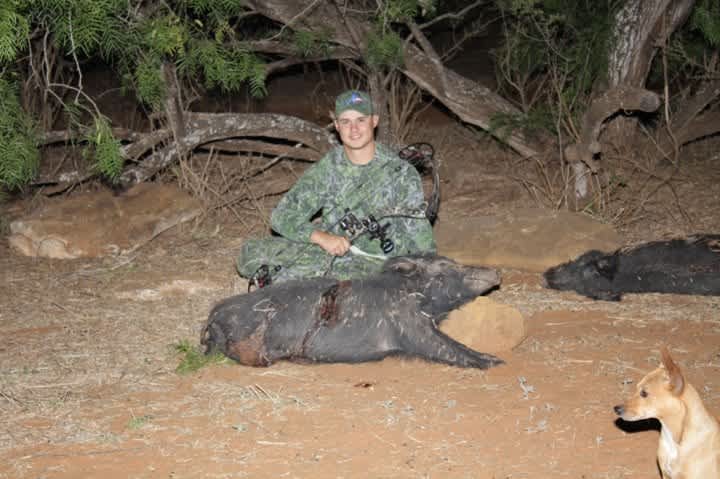What Should Texas Do with Its Hog Problem?
Sky Watkins 01.04.13

We have all heard the horror stories of the over-abundant number of wild hogs sweeping the state of Texas. The saying goes that there’s two types of places in Texas: those with hogs and those that soon will have them.
The state in general has gathered a lot of research, assisted in opening and legalizing many new holding facilities and has even gone as far as to allow wild hogs to be shot from helicopters. All of these items are great, but none really cater to the largest source of hog eradication in the state–the local, average, salaried hunter.
The problem at hand
With everybody griping about the damage caused by hogs, you’d think they’d be happy to let you shoot them, right? NOT! Wild hogs and their newfound popularity are bringing a higher hunt fee year in and year out. At the turn of this new year I have found the lowest price to be about $100 per day, with no lodging and meals and a two-day minimum, and the higher end prices are running around $1,500 for three days and four pigs with lodging and meals.
Even at the low end, hog hunts price a lot of people out of the opportunity to kill a few. However, there is a huge demand for hog hunts in the state of Texas. Is the state of Texas missing out on a new source of income?
Turning our problems into revenue
Hear me out before you call me completely crazy and understand that this same model is used daily on a smaller scale with private ranches throughout the state. Would it be possible for the state to erect their own buying stations or public hog hunting ranches?
Here’s the idea: Station A is located in North Texas. Station A agrees to pay $15 per pig for every live pig brought into the station. Station A also has a 500-acre (random number) fenced hunting area in which the hogs are released after purchase from the trappers. Two guides will have full-time jobs working Station A’s 500-acre hunting facility. Work will include dropping off and picking up hunters, maintaining the log of hogs killed, keeping bait stations filled and maintained and assisting hunters with their kills. The two guides will earn $60.00 per day plus any tips they receive from hunters.
To hunt Station A, clients will pay a $15 trespassing fee plus an additional $40 for each hog they kill. There will be no lodging or meals provided, but there will be designated campgrounds where you can set up your tents and cookers.
How this benefits the average hunter
Let’s say Bob really wants to get a couple of pigs but can’t stomach paying even the low end of $200 for a “chance” at two hogs. Bob now has the opportunity to pick his own amount of hunting days at Station A, at a price of just $15 per day. Bob also knows that if he doesn’t kill a hog, he only loses his $15 trespassing fee instead of $200. Bob could go to Station A for a one-day hunt, kill two hogs, and go home that night having paid $95 for a full day of hunting and two hogs.
This gives guys like Bob the opportunity to participate in wild hog hunting without having to dish out a ton of money for an animal that people are supposedly “trying to get rid of.”
What this costs the state

That’s an extremely tough question to answer but here’s a rough idea.
- Land and buying station facility
- Two guides and two buy station employees at $60/day
- Assuming 10 bait stations, $540/month in feed
- $1,700 initial feeder set up cost
- $1,000 initial blind set up cost
- Two vehicles
- Campsite water and electric
- Insurance
How the state makes money
Let’s take another look at Bob. Bob paid a $15 trespassing fee and shot two hogs at $40 each. Let’s also say that Bob brought two buddies with him that experienced the same hunt. All three men were guided that day by Big Jim.
- Bob and friends: $15 x 3 = $45 trespassing and $40 x 6 = $240, for a total of $285
- The state paid $60 for Big Jim plus 6 x $15 = $90 for the hogs, for a total of $150
Now you would obviously have to take into account the per day cost of all other bills, but you can see fairly easily that the state does have plenty of potential to profit from such a venture.
Conclusion
Realistically, this idea would get shot down by the majority of people who have the actual pull to make something like this happen. But to a guy like me who is sick of hearing how bad of a feral hog problem we have while having to do strenuous research just to locate a place to hunt them without having to take out a loan, this idea seems great!

